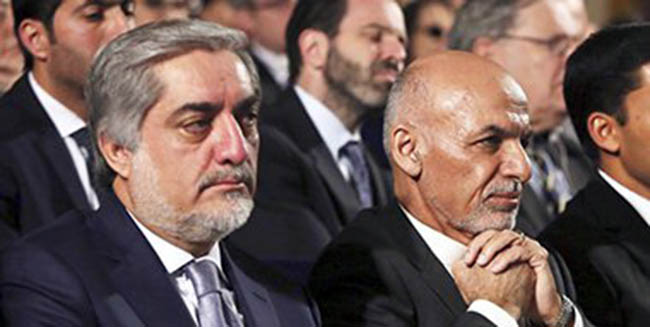The rule of law is one of the issues which has drawn the attention of lawyers, economists and political figures. Today, it is accepted that it will not be considered legal system without rule of law and officials’ respect for it.
Both historically and culturally, Afghanistan has encountered problem in the field of rule of law. Extreme social, economic and cultural backwardness, mainly tribal structures, the emergence of fundamental and ideologue groups through coup and bloody battles for power and interference of foreign governments are considered as major factors in this regard.
Being recorded as the bloodiest and most destructive part of the history, we witnessed not only the rise and fall of regimes, institutions, organizations and ideologies within the past three decades, but also social and political awakening and campaign for justice. Establishing legislative and judicial institutions such as National Assembly, Supreme Court, the Ministry of Justice, approving Constitution, Parties Law, Criminal Law, Law on protection the rights of women and children and hundreds of other sub-laws are the main outcomes of Afghanistan after civil unrests.
Despite these outcomes, Afghan government still wrestles with large-sale challenges in the issue of justice and judiciary and so on. Afghans face many problems and are denied legislative services in many cases which made them lose trust in legislative institutions. Afghan government is responsible to fight any kinds of failure and abnormality through careful planning and provide access to justice.
Due to international commitments and continuation of mutual cooperation with its international allies, Afghanistan has accepted principles and standards of human rights, access to justice, the rule of law, adherence to treaties and international conventions. Therefore, this country is responsible to undertake fundamental reforms in judicial field. So, it will fulfill its international commitments besides answering the citizens.
Government’s Achievement in Judicial Reform
Luckily, the government has lately taken high steps in this regard. The National Unity Government (NUG) could establish considerable institutions for fighting violence against women and children, despite many challenges, with the view to persuading its international allies.
In addition to creating Special Court for Women, the NUG has established: Counter Violence Administration for Women and Children in Afghanistan’s Attorney General. Currently, the Supreme Council of the rule of law under the supervision of the President, Center of anti-Corruption Campaign in the Attorney General, Justice Committee and Law Committee under the supervision of the Second Vice President Sarwar Danish – these are all for structural growth of judicial sectors in Afghanistan. Recently, National Administrative Reform Program in Afghanistan has been confirmed and its implementing program is started – implementing program of the relevant institutions in the Law Committee will be finalized in the coming days.
Government’s Achievements in Reforming and Adjusting Law
President Ashraf Ghani may realized the fact that the rule of law is directly related to the quality of the country’s law. Therefore, he has considered the reformation of law as bases of reformation in the judicial system and submitted this hard task to his Second Deputy Sarwar Danish – who has reformed and adjusted more than hundred legislative documents, in the Cabinet Law Committee, up to the end of 1395.
To improve the status of women and children in the community, the NUG has finalized the Law on Prevention of Harassment of Women and Child Rights Protection Law for the first time.
The Challenges of Rule of Law in Afghanistan
Last year, structural reforms in the judicial sector raised Afghanistan’s position for the first time in the international ranking and prompted public hope. In terms of enforcement, however, women are frustrated with judicial system and resort to suicide and self-ignition to free themselves from the cruelty of time. Farkhunda’s case is still pending in the layer of judicial corruption in spite of public sentiments – which was called as disgrace and shame for the judicial institution by Second Vice President – in the Supreme Judicial Seminar held in Inter-Continental Hall.
Bribery and administrative corruption in Afghanistan have kept the market of speculators and managers warm. Sexual and ethnic discriminations are dominant rule against Afghanistan’s standard and adjusted rule. The contrast between structure and broker in Afghanistan’s justice system is noticed clearly. Besides structural reforms, the NUG should consider fundamental reforms in the attitude of the brokers. Otherwise, as Montesquieu puts it, if good law is not enforced, it is the same as it has never existed.
Bribery, embezzlement, abusing position, appointing relatives in key posts and compulsion by illegal armed groups are the major factors in violation of law in Afghanistan. Just yesterday, the provincial council head of Herat province, resorted to demonstration on street against the decree of judicial body.
On the other hand, the prevalence and persistent of corruption is caused by: abusing official authorities, selecting managers based on ethnic, regional and group criteria, unfair payments, government staff’s disbelief in retirement, low level of education and other relevant facts. Hence, strategies to combat corruption and evasion of law, considering the particular situation, are as following:
1-Attracting international supports in financial and cultural fields and spending them for the improvement of Afghans’ living condition and culture.
2-Implementing and monitoring the rule of all in all administrative and social levels.
3-Entrusting jobs to the right people via administrators’ transparent selection based on transparent competition.
4-Enhancing the quality and quantity of government staff’s living, such as paying on time, tackling homelessness and other social welfare; otherwise it will be hard to eliminate bribery, corruption and administrative recession.
5-Struggling to strengthen the authority of central government and preventing any attitudes which may undermine national unity and interests in the country.
Home » Opinion » Achievements and Challenges of NUG in Rule of Law
Achievements and Challenges of NUG in Rule of Law
| By Syed Asif Husaini

